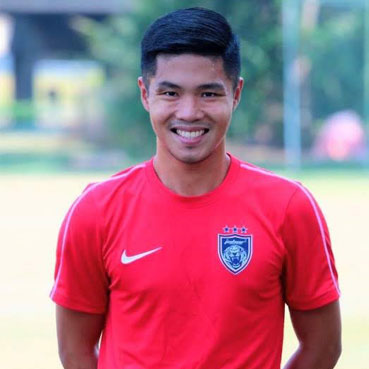
Bryan Yong
Could you share with us about your journey as an Academy Fitness Coordinator in Johor Darul Ta’zim Football Club (JDT FC)?
Before graduating in 2016, I worked on getting my coaching licences Football Association of Malaysia (FAM) Basic & Asian Football Confederation (AFC C). I kept myself mentally active by coaching amateur teams, conducting one-on-one training with amateur players, and testing training methods on myself.
In 2017, I landed my first professional coaching job at Melaka United Soccer Association. I worked with the under-21 (U21) team and first-team reserves. My first year was a steep learning curve as I had to balance between Sports and Exercise Science application and implementing football components into training sessions.
In 2018, I was assigned to the under-19 (U19) team. Personally, I’ve managed to find the balance of combining Sports and Exercise Science with football components. Although we had a successful squad for the year, I resigned mid-way due to professional differences. I then took the time off to work on my Asian Football Confederation (AFC B) coaching licence.
Later in the year, I sent my resume to JDT FC and the rest is history.
What inspired you to play football? And what drives you to pursue your career in Sports and Exercise Science?
I played football for fun and as a hobby during my teenage years. When I finally joined an amateur club when I was 18 years old, I decided to take football seriously after knowing the rewards and payoffs at a professional level. What a dream it would be to work and earn money doing something I love!
I couldn’t secure a coach during those times, so I had to train myself by watching YouTube videos and seeking advice from veteran players. I attended an open day at a polytechnic in Singapore, which offered sports science and it caught my attention. The knowledge I could attain would be used to better myself as a footballer.
I improved greatly but it was not enough. I had trials from 2012-2013 with the Singapore Prime League and Division 1 teams but I was too far behind in skills and physical development. Regardless, I continued to train myself physically and be the best version of myself.
As time passed in researching new training methods, applying scientific protocols in designing training sessions and practising with them, I found myself training other players and working with amateur football clubs as their fitness coach.
How do you usually motivate or train the athletes? What challenges do you face in your current role and how do you overcome them?
On a day-to-day basis, I’d have to constantly do my research and plan for engaging and incrementally demanding training sessions. There will be players who are not 100% mentally prepared on the day itself. These players will require a bit more vocal encouragement during sessions but overall, every player aims to better themselves after each training session.
Off the field, I tend to stay in touch with players personally using social media platforms. I’d challenge them to exercises and praise them for their positive antics related to fitness out of the field.
If I ever do spot a drop in performance or lack of enthusiasm that goes on for prolonged periods, I’d speak to the player personally and help them as much as I can, only if they open up and seek advice and help.
In what ways has your education at PSB Academy added value to your personal development? How has it built your character?
The lecturers have taught me to learn and follow scientific facts from the books, and at the same time to be open to exploring new possibilities through the research process and experiments.
In doing so, I’ve learnt to be a bit sceptical with new/buzzworthy trends that may appear from time to time. This has made me realise that many new trends are recycled and renamed training principles that have existed for a long time. This assures me that the science and methodologies we have learnt still hold water and are ahead of their time.
Regardless, it is still important to keep an open mind and read through the contents or principles of such training methods. Maybe they’re recycled or maybe there’s something new. Knowledge in Sports and Exercise Science is constantly expanding with tiny but sure steps forward, and I sure do not want to be left behind.
What would be your advice for students who are planning a similar career path?
First of all, you have to love the Sport and Fitness altogether. You’ll have to experience the pains and dread that comes with physical training to better understand how the human body works, and know-how and when to push your players physically. Combine that with your knowledge and competence in football, as well as design training sessions that are technically engaging and physically demanding at the same time.
Know what your industry requires, such as coaching and educational certificates. Always give your all and aim to impress with every course you attend. You’ll never know if you’ve impressed an instructor or senior coach that happens to look for coaches to hire. Leave yourself out there to be picked and get your face and name recognised. That’s what happened to me.
Don’t be discouraged by working with coaches that apply more traditional or old-fashioned coaching methods. You are there for a reason, for your knowledge. But inch forward with your methodologies, introduce information and new methodologies to your fellow coach and earn their trust in your training methods. They are willing to learn but be careful not to be disruptive and dismissive of their methods in your attempt to implement what you know as well.
Share a personal quote or mantra you live by.
Stay hungry, keep climbing.




 TOP
TOP
